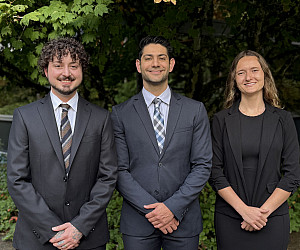Prof. Benjamin Advocates to Establish State Obligations re: Climate Change
Professor Lisa Benjamin co-authored briefs to the International Court of Justice and the International Tribunal for the Law of the Sea to establish state obligations around climate change as part of the International Union for the Conservation of Nature. Clinic students supported the effort.

Furthering the fight for international climate justice, Professor Lisa Benjamin recently submitted briefs to international bodies that advocate for state obligations regarding climate change. The briefs, co-authored by members of the IUCN World Commission on Nature, were submitted to the International Court of Justice (ICJ) and the International Tribunal for the Law of the Sea (ITLOS) on behalf of the International Union for Conservation of Nature (IUCN). The brief submitted to ITLOS was supported by the work of Global Law Alliance (GLA) Clinic students.
The advisory opinions, if favorably issued by ITLOS or ICJ, could establish state obligations around climate change, a case of first impression before the international courts and tribunals. As a member of an IUCN-subsidiary body, Professor Benjamin was asked to explain in her ITLOS brief the vulnerability of Small Island Developing States (SIDS) to climate change. Island nations are particularly vulnerable to environmental harms such as ocean acidification, tropical cyclones, and sea level rise, which is swallowing up coastlines. The request for ITLOS and ICJ advisory opinions was spearheaded by the Commission of Small Island States.
GLA students Antonia Langowski ’25, Ally Grimaldi ’24, and Rianka Macwan ’24 assisted Benjamin’s work with research. They watched and summarized live hearings before ITLOS on behalf of the IUCN, searching for statements made by states which would contradict the IUCN briefs. “It was such a unique experience to listen in on the government representatives from both low-environmental-impact nations and high-environmental-impact nations in their plans (or lack thereof) to contribute to global climate mitigation,” said Langowski. “Some nations were eager in their pursuits to prevent further ecological damage whereas others were more willing to shift the blame or avoid climate liability altogether.”
The ITLOS advisory opinion will be issued first and may inform the ICJ advisory opinion, which has the potential to widely influence international state climate change obligations. The ITLOS opinion is expected to be issued in 2024. The ICJ opinion is expected next year.
“These advisory opinions are historic. Never before have we seen international courts and tribunals issue opinions regarding state obligations on climate change. While they will only be advisory opinions, the hope is that they will set progressive expectations for ambitious state action on the climate crisis,” said Professor Benjamin.
Professor Benjamin has a long resume in fighting for international climate justice. She was the Vice Chair for the UN Framework Convention on Climate Change (UNFCCC), is a co-chair of the Climate Accountability working group, and is a member of the Expert Peer Review Group in the Race to Zero campaign. She also served as the legal advisor to The Bahamas during the UNFCCC Paris Agreement negotiations.
IUCN wrote a story about this here. The brief is confidential until oral proceedings later this year.
Law Communications is located in room 304 of Legal Research Center (LRC) on the law Campus.
MSC: 51
email jasbury@lclark.edu
voice 503-768-6605
Cell: 626-676-7923
Assistant Dean,
Communications and External Relations, Law School
Judy Asbury
Law Communications
Lewis & Clark Law School
10101 S. Terwilliger Boulevard MSC 51
Portland OR 97219
More Stories

Comparative Report to Curb the Expansion of Industrial Animal Agriculture
The analysis of how courts are addressing industrial animal agriculture in four countries is the first of its kind from the Farmed Animal Protection Project of the Center of Animal Law Studies (CALS).

Year in Review
Top Stories of 2025
As the calendar year draws to a close, we’ve compiled a sampling of top stories from the undergraduate college, the graduate school, and the law school.

Justice for Animals and the Environment on a Global Scale
The law school’s Global Law Alliance is helping to advance environmental and wildlife protections across the globe while giving students hands-on experience in international law.

2025-2026 Multnomah Bar Association Fellows Announced
Three 1ls were named as Multnomah Bar Association Fellows: Finn Johnson, Hooman Dadkho, and Christina Smith
